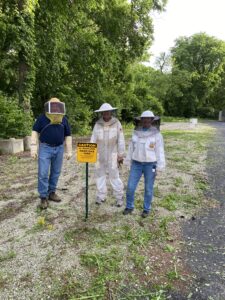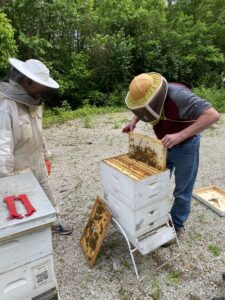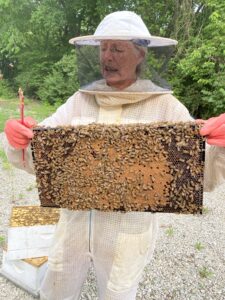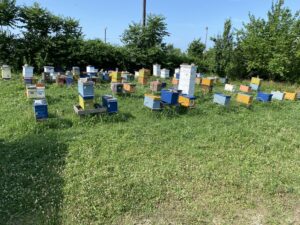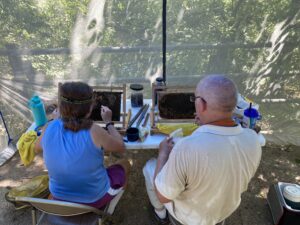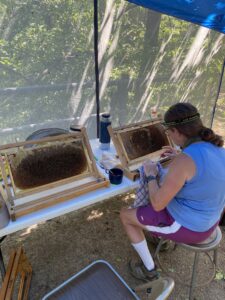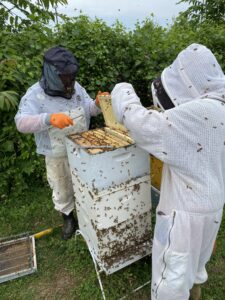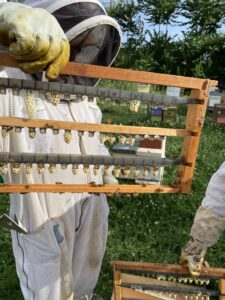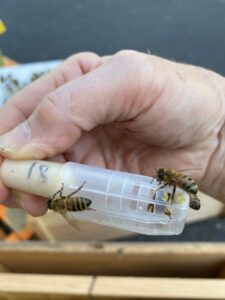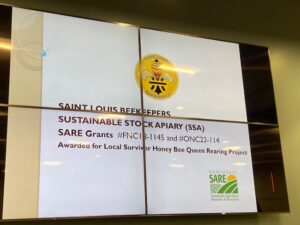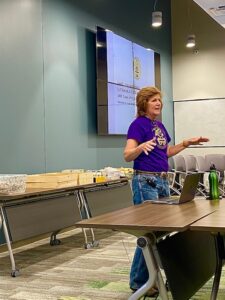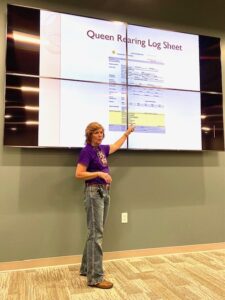Final report for ONC22-114
Project Information
This proposal addresses the limited available local, survivor honey bee queen stock for access by beekeepers in the Missouri/Illinois region. We will raise queen stock from local survivor colonies, make them available for sale in our region, and provide training on sustainable queen rearing to beekeepers through various modes of outreach. In 2018 this group was awarded SARE grant FNC18-1145 to support the newly formed SSA Queen Rearing Apiary, to facilitate the development of locally-adapted queen stock by increasing the number of resource hives, supplies, testing and labor. We will continue this work and expand upon progress made with the previous grant including adding a second (resource) apiary, innovating to improve methods of queen rearing to produce greater quantity of queens and improve methods of “banking” queens for availability to beekeepers throughout the active season, all while maintaining the integrity of the feral drones stock for mating, in the original apiary area. Being able to provide both mated queens and nucleus colonies from this survivor population, that successfully overwinters in our zone, increases the purchasing beekeepers' springtime hive strength and honey production, while decreasing cost of stock replacement.
- Produce 100 locally-bred and adapted honey bee queens plus 20-30 nucleus colonies with the same queen stock, each season
- Provide access to this local queen stock by making the queens and nucs available to beekeepers in our region for purchase
- Document over-wintering success of queen honey bees produced, over two cycles during the 21-month period of the grant
- Survey purchasing beekeepers progress, get feedback and report
- Share outcomes and information with local beekeepers through beekeeping association meetings, field days, social media, to database email of the Eastern Missouri / Southern Illinois region's active beekeepers, with a final video to NCR-SARE.
Successes:
Saint Louis Beekeepers Sustainable Stock Apiary (SSA) succeeded in producing 97 queens during the 2022 queen rearing season. Most of the queens were harvested and sold to local beekeepers.
160 queen cells were developed, mostly through cell grafting. Of those, 97 successfully became laying queens. We were able to generate revenue in 2022 from the sale of 18 starter colonies, overwintered from 2021, and 62 queens from 2022 production season. We lost 8 harvested queens in transportation and retention delays, with the remaining 27 queens from the final graft established in 5-frame nucs to overwinter for sale as starter colonies in Spring, 2023.
Areas of improvement:
Our target for queen development (to successful mating and egg laying) is 75-80% success rate and we achieved 60%.
Possible paths to increase our success rate?
- Use two starter/finishers instead of one. We may be placing too many grafted cell cups in the 1 starter/finisher. We speculate this may diminish the quality of the larva in the capped queen cells, when environmental conditions are less than optimal, as excessive heat was an environmental factor in 2022.
- Refreshing our mating nucs between grafts with a new cohort of nurse bees. It was noted when harvesting queens that several mating nucs had few bees and low on resources. With the addition of the second yard, our resource apiary, we should be able schedule additional harvesting and transporting nurse bees for this purpose into our calendar.
- Increase time on calendar to include observation of the following situations for correction -
- of dead out or queenless nucs when harvesting queens. This will alert us to which nucs need help.
- Make note if unopened queen cells remaining beyond the point they should have hatched and determine viability. Are these the result of supersedure or replacement of an inferior queen or queen larva? Replace with synthetic QMP (Queen mandibular pheromone) if necessary to keep from going laying-worker while we work to rebuild these mating nucs and place the next round of grafts.
Cooperators
- - Technical Advisor
Research
The management and assessment of the available queen-rearing stock begins with pathogen testing of successfully over-wintered, strong honey bee colonies in the original apiary. We take samples for mite testing, which we do in the apiary, as well as for genetic testing for pathogen load, which we send to the National Agricultural Genotyping Center lab for that work. In 2023, NAGC was able to provide quantitative data in the format of a table (available at https://genotypingcenter.com/services/bees/quantities/) which was helpful in comparing our pathogen loads against other samples from across the United States and Canada. In 2023 our pathogen loads, which showed positive in only 5 out of 18 known organisms and spores, all fell in the "Average" to "Below Average" range. The following are NAGC's reports for our 2022 and 2023 starting stock.
NAGC SSA Pathogen Report.2022.1
NAGC SSA Pathogen Report.2022.2
NAGC SSA Pathogen Report.2022.3
The next step in this project was to establish the additional resource apiary, to populate it with mature, established colonies from the original apiary, about 35 miles away. We established this yard in 2022 and solicited the help of additional volunteers to help maintain this apiary. We harvested bees, brood frames and full nucleus colonies for transport to the original queen mating yard as needed, throughout the season, both in 2022 and 2023.
With the additional resource support provided by the colonies established and growing at the Fenton apiary in 2023, we were able to begin grafting for queen rearing as soon as weather allowed, not having to rely on resources required for queen-rearing solely at the Wellston yard.
Queens cells are grafted and incubated in queen mating boxes on a calendar schedule, see attached. Young nurse bees and nectar and pollen resources to support raising these queens were harvested from the resource apiary in Fenton. We are including a detail summary of the queens raised for the both 2022 and 2023, below.
SSA Queen rearing Calendar 2022
SSA Queen rearing Calendar 2023
2021 was the first year we chose to hold the last graft of queens to be over-wintered in 5-frame nucleus colonies to be sold in the following spring. The first revenue-generating work of 2022 and 2023 is the sale of these over-wintered nucleus colonies with SSA queens raised the prior year.
In 2022 160 queen cells were developed, mostly through cell grafting. Of those, 97 successfully became laying queens. We are improving processes and along with the additional resource apiary, our production has improved. We have not yet met our annual queen-rearing goal of 100, but are confident we will do so in the second year of this grant.
SSA QUEEN GRAFT 2022.1 SSA QUEEN GRAFT 2022.2SSA QUEEN GRAFT 2022.3SSA QUEEN GRAFT 2022.4
SSA QUEEN GRAFTS & HARVESTS, 2023 SEASON
We were able to generate revenue from the sale of 62 queens from 2022 production season. We lost 8 harvested queens in transportation and retention (queen banking) delays, with the remaining 27 queens from the final graft established in 5-frame nucs to overwinter for sale as starter colonies in Spring, 2023.
SSA Queen Grafting results 2022
SSA Queen Grafting results 2023
Educational & Outreach Activities
Participation summary:
The SSA Queen Rearing group hosted a grafting session at Isabee’s class room on the evening of July 25, 2022. Twenty-five area beekeepers attended this workshop to learn grafting processes and try their hand at using grafting tools. The frames of eggs and young larvae for this project were harvested from the SSA Resource yard, 2 miles from this classroom. The close proximity of this additional resource apiary really facilitated getting fresh, unstressed material to work with. The grafts were then returned to the bee yard and placed in available mating nucs for incubation. One queen that developed and successfully mated was taken for use by the student who grafted it, the other two were placed in over-wintering nucs, to be sold ion Spring, 2023.
Additional outreach was provided as PowerPoint presentation in 2022 and 2023.
PowerPoint presentations were given to several area beekeeping clubs including Saint Louis Beekeepers, Quad County Beekeepers (Troy, MO) and ShowMe Beekeepers (Jefferson City, MO) in 2022; Eastern Missouri Beekeepers, Rolla, Missouri Beekeepers, Waterloo, Illinois Beekeepers and the Great Plains Growers Association in 2023. These talks included the decision-making process, the set-up of the queen rearing operation, the activities and processes afforded by the SARE grant funding, and the productivity attained. The intention of these presentations is to provide a methodology for other groups of beekeepers to follow to work toward sustainable local queen-rearing in the bi-state area.
In 2023, we conducted a survey of beekeepers, both on-line and by phone, who had purchased queens from this project. 39 our of 78 of those responded. We queried them both about the queens themselves and about the beekeepers' purchase decisions for queens from this program.
The results of our survey indicate 36 our of 39 (92%) of respondents would likely or definately purchase queens from the breeding program again.
SSA Queen Rearing Video Diary, sharing the people, location, processes and successes will be uploaded to Saint Louis Beekeepers' YouTube channel in March, 2024.
Learning Outcomes
Project Outcomes
Progress has been made each year of this project, through both SARE grants (FNC18-1145 and ONC22-114) toward both increased production quantity and trait quality of queens raised. The queen breeder group was able to make value added product in the form of over-wintered nucleus colonies in both of the years of this grant, utilizing excess late-season mated queens along with available equipment to make salable nucleus colonies and generate working reveuen the following spring. Profit margins on these over-wintered nucs are substantially greater that individual queens and the group raised $8,000 and $9,000 per year, respectively, during the grant period.
The quality and quantity of queen stock available at the end of the grant period will be sufficient and of stable character to continue to provide access for local beekeepers, as well as generate revenue for the group, going forward.
The group is working on a video diary of the process and progress over the grant period to be posted to Saint Louis Beekeepers YouTube channel, to serve as a process example for other potential breeders of locally-adapted queen stock to follow.
We plan to continue the natural selection of desirable traits in this local queen stock by participating in additional research in 2024.
UBeeO is a brand (2024) new sampling protocol (Optera brand is the manufacturer, https://opterabees.com/) to test for hygienic behavior in honey bee colonies. While previous pathogen testing through the National Agricultural Genotyping Center has helped us select based on actual pathogen load, from which to breed queens, this new testing will enhance our selection criteria to also identify a behavioral trait that indicates the worker bee's ability to sense (through pheromone detection) and respond to remove disease-affected developing brood.
There is a local "grass-roots" project in our area, lead by a retired bee researcher to collect data from across the United States for UBeeO testing. This group plans to test and provide data to this project. If successful, the data collection and analysis will speed-up gathering of meaningful information for breeding selection. Jim Masucci at jdmbees@gmail.com is soliciting beekeepers involvement through Bee Culture magazine, print and electronic articles, March, 2024.
We also plan to provide samples to the Purdue Bee Lab to help identify subspecies lineage. Their work plans to collect and analyze genetic material from beekeepers in the United States and Canada and provide genomic "...tools (to) allow beekeepers to verify stock identity, speed up selective breeding, and identify locally adapted populations." See https://beemolevo.com/research
